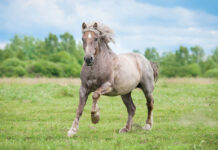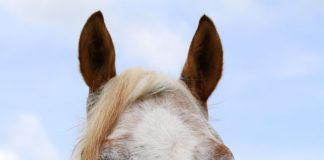
Q: I have a horse that was diagnosed with anhidrosis. Aside from medication, is there anything I can do to help him? I once saw a horse like that at a barn I was at before, and since medication wouldn’t help him much, the owner decided to start giving him half a beer every morning to help him sweat. Apparently it worked, but is that a good idea?
A: The good news is that yes, there are lots of things you can do to help a horse with anhidrosis, or that lacks the ability to sweat either partially or completely. We still don’t understand exactly why horses develop this condition – and there is no FDA-approved prescription medication to treat it – but the supplement One AC does have research behind its use to support a horse’s normal ability to sweat.
According to the manufacturer, horses that have been diagnosed with anhidrosis should begin receiving the supplement before the beginning of the hot season. The manufacturer also suggests reducing strenuous training or work for a minimum of three weeks after first putting the horse on One AC for best results. In fact, some owners keep their nonsweating horses on One AC year-round and simply lower the serving size during the cooler months to avoid having to start up again.
Because sweating is a horse’s primary means of cooling itself, horses that don’t sweat when the temperature rises or when they exercise are at risk of becoming overheated to the point of heat exhaustion and collapse. Here’s some advice that should keep your horse out of trouble:
- If you’re bringing a horse used to a cool, dry climate into a hot, humid one, allow him to acclimate with 10-14 days of turnout and light work before returning to regular training and showing.
- Get your horse “legged up” or conditioned before the hot months. This way you won’t have to do distance riding or strenuous interval training in addition to regular schooling when it’s warmest.
- Work your horse during the coolest parts of the day – usually early morning or evening.
- Observe your horse closely during exercise for signs of overheating, such as rapid breathing or panting, rapid heart rate, and fatigue.
- Cool your horse off with water as cold as he will tolerate! Upper level event horses are repeatedly sponged with ice water and scraped until the water coming off the skin is cool.
- Provide cool air with good barn ventilation, fans, and even air conditioning.
- Let your horse drink cool water after exercise if he wants, and encourage drinking while replenishing the minerals lost in sweat by providing salt and a balanced electrolyte supplement.
- Look for and treat any underlying diseases – especially respiratory conditions – and reduce other sources of stress.
Although some people swear that beer improves their horse’s ability to sweat, you may be better off sticking with a researched product and sound management tips.






